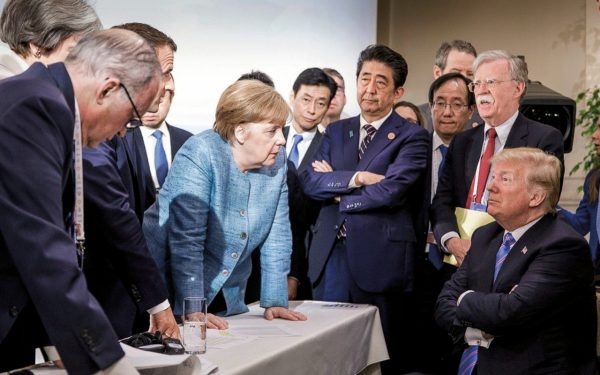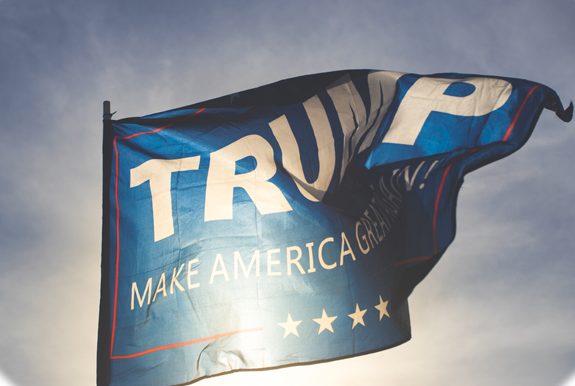Democracy and despotism in a digital age.
The United States in Crisis

Excerpted from Edward J. Erler's new book.
Edward J. Erler’s The United States in Crisis: Citizenship, Immigration and the Nation-State (The Claremont Institute: 2020) presents as clear a view as any of the internal enemies America now faces and the catastrophe that will ensue if they are allowed to triumph. In this excerpt, Erler describes the fantasy of a borderless globe which is still the animating desire of our ruling classes. He observes that the impulse of Democrats and their enforcers in BLM and Antifa to unmake the nation-state is in fact an impulse toward unremitting tyranny.—Eds.
Before the coronavirus pandemic gripped the American consciousness in early 2020, America was seized by a pandemic of another kind: hysteria among the nation’s elites over President Donald Trump’s immigration policies. It was driven for the most part by the Trump administration’s attempts to curtail illegal immigration by the adoption of a zero-tolerance policy for illegal border crossers, significant restrictions on asylum policies, the use of the National Emergencies Act to shift funds allocated for other purposes to build a border wall, the use of the “remain in Mexico” policy for asylum seekers while their claims are evaluated, and the end of the long-standing “catch and release” policy as well as by the bare suggestion, in 2018, the year of the sesquicentennial of the adoption of the Fourteenth Amendment, that the policy of granting automatic birthright citizenship to the children of illegal aliens born in the United States should be ended. The frenzy generated by the progressive liberal press, Hollywood radicals, progressive politicians (both Democrat and Republican), the minions of the deep state, academics, and law professors has been unprecedented.
Progressive constitutional scholars have even advanced the theory that that there are no enumerated powers in the Constitution to protect borders. These scholars, who would not ordinarily seek to limit the power of government by invoking enumerated powers, have suddenly hit upon an argument that, if taken seriously, would make it impossible for the United States to maintain itself as a sovereign nation. Protection of citizens by maintaining the integrity of the nation’s borders is inherent in the idea of sovereignty. Yet, the newfound argument of progressive constitutional scholars, who have fallen into league with libertarian constitutionalists on the issue of nationalism, has meshed nicely with the most progressive elements of the Democratic Party who have proposed abolishing Immigration and Customs Enforcement.
Citizenship, Borders, and Nationalism
In the 2016 election, Donald Trump made citizenship, borders, and nationalism the pillars of his campaign. He defended American exceptionalism because he understood the importance of sovereignty to national independence and individual liberty. In becoming “one people,” according to the words of the Declaration of Independence, Americans also became a “separate and equal” nation, whose citizens shared equal rights and privileges under the rule of law. These were privileges that remained exclusive to citizenship, and this is what it meant to be part of a people who shared the same political principles to which they had consented.
President Barack Obama gave a notorious answer to a question he was asked at a press conference after a NATO summit meeting in Strasbourg, France, in April 2009. When asked whether he believed in American exceptionalism, as some of his predecessors did, or whether he had a different philosophy, the President gave a curious, but typical Progressive answer: “I believe in American exceptionalism, just as I suspect that the Brits believe in British exceptionalism and the Greeks believe in Greek exceptionalism.” But, as the President clearly implied, if every country is exceptional, then no country is exceptional. In the universe of cultural relativism that the progressives inhabit, the claim that one nation is exceptional is tantamount to asserting the superiority of that nation and its political principles; this is something intolerable under the canons of cultural relativism that demand all cultures be deemed equal. Obama’s Secretary of State, John Kerry, spelled out the implications of the President’s revealing statement about American exceptionalism when he advised his fellow citizens “to prepare [themselves] for a borderless world.”
A “world without borders” will, of course, be a world without sovereign nation-states and, consequently, a world without citizens. The idea of “citizens” of the world is a simple solecism. A world without borders will be the “universal and homogeneous state,” the European Union (EU) on a world scale. But in this “world state” there will be no citizens; rather, there will be clients who are ruled by unelected bureaucrats or administrative experts, much like the European Union is run today. These experts rule without the inconvenience of having to consult or rely on the consent of the people because in this new world, administrative expertise has replaced politics and political choice. Scientific administrators know what is good for the people better than the people themselves do. Freedom to choose has been rendered superfluous by science. Freedom has been revealed to be a dangerous delusion now dispelled by science. Welfare has replaced freedom as a goal in the global community. Whatever the administrators decide can be translated directly into practice because the “universal homogeneous state” will not be a free state where individuals have choice. Choice frequently leads to bad decisions. The administrative state will eliminate choice and the possibility of mistakes that accompanies choice. In other words, it will be a tyranny where the decisions of the experts can be translated directly into practice without the intermediary of the consent of the people. Tyranny will not be alleviated by the fact that it is based on progressive science and administered for the good of humanity. This universal tyranny will be no different—no less severe, no less degrading—than tyrannies of the past. In fact, this universal tyranny will bring a new kind of terror and violence to its rule; it will be more efficient and more pervasive because it will be backed by all the innovations of science and justified by the advancement of the human estate, the professed goal of modern science from its very beginning. Its protestations of a benign purpose will be a thin disguise for its brutal and psychologically devastating reality. Clients of the homogeneous state of what is advanced as the community of the “free and equal” will be forced to accept equality as indistinguishable from freedom even if some retain the consciousness of the difference but are afraid to point it out or refer to it.
Free government—constitutional government and the rule of law—has existed only in separate, sovereign nations. The best guarantee of a peaceful and free world would not be a global state, but a system of nation-states made up of liberal democracies. Such nations rarely (if ever) go to war with one another. The most durable basis for a stable and peaceful world is a system of sovereign nation-states. Since President Trump won the election in 2016 with an explicit appeal to restore the American nation-state, the liberal Left has mounted a full-scale attack on the nation-state as a source of a plethora of evils. Nationalism, we are assured, breeds extremism and leads inevitably to wars, racism, ethnic animosities, exclusivity, corporate exploitation, and many other evils. The way to defeat these evils is for nations to band together into international organizations of one sort or another as a way to dilute or defeat the consequences of nationalism.
Macron and the Egoism of Nations
An outstanding example of this line of thinking was a speech by French President Emmanuel Macron on November 11, 2018, in front of the Arc de Triomphe in Paris, marking the hundredth anniversary of the end of World War I. Macron’s remarks, although never mentioning his American counterpart by name, were clearly a stinging rebuke of President Trump, who was present at the speech. The millions who died in the Great War, Macron declared, were fighting to defend the “universal values” [valeurs universelles] of France, those values that rejected “the selfishness of nations only looking after their own interests.” “Patriotism,” Macron avowed, “is the exact opposite of nationalism; nationalism is its betrayal” [trahison]. The patriotic Frenchmen who fought bravely in World War I would no doubt be surprised by Macron’s revisionist history. It is difficult to believe that the soldiers who endured such great sacrifices in the defense of France were not inspired and sustained through their long ordeal by a deep sense of patriotism. In fact, it is utterly impossible to believe that such great sacrifices could have been mounted on behalf of universal values only remotely connected to their homeland. Does anyone believe they were concerned with eradicating the “egoism” of nations? This surely exceeds the wildest postmodern fantasy that seems to have inspired President Macron’s attack on the nation-state! The men who fought the Great War were not postmodernists; they fought for their homeland because they were patriots. World War I was called “the war to end war.” But it served only as the prelude to World War II and that to the Cold War and the hot wars that ensued within the extended Cold War.
Trump’s Speech to the United Nations on September 24, 2019
In September 2019, President Trump gave a speech to the United Nations (UN) that was undoubtedly designed to be a reply to Macron. “The future does not belong to globalists,” President Trump told the dedicated globalists at the UN. “The future belongs to patriots. The future belongs to sovereign and independent nations who protect their citizens, respect their neighbors, and honor the differences that make each country special and unique.” In this rousing defense of nationalism, patriotism, and the nation-state, Trump clearly held up the United Kingdom (UK), which was at the time struggling to complete its separation from the European Union, as a warning: “If you want democracy, hold on to your sovereignty.” It is astounding that the land of Hobbes and Locke would voluntarily cede its sovereignty to the EU. It does not mitigate the UK’s error that it did so voluntarily and by indirection. Trump could have added that sovereignty once lost—or even diminished—is rarely regained. It is unclear that the UK will ever regain its complete sovereignty, even after leaving the EU. This was Trump’s warning to all nation-states, and it should not be taken lightly. It will, however, be ignored or condemned as advancing all the evils associated with nationalism by irrepressible progressive liberals for whom all universal values are threatened by the existence of sovereign nations.
For Macron—and the many internationalists and globalists who share his views—nationalism is the very definition of war. The egoism and self-aggrandizement inherent in the idea of nationalism means war is inherent in the idea of nationalism itself. This is standard fare in progressive liberal ideology. It may be impossible to eradicate the egoism of individuals (their desire to rule), but the eradication of the nation-state may eliminate or diminish the force of national egoism in the world. International alliances and cooperative organizations can replace the nation-state and eliminate the egoistic conflicts that are inspired by the world of independent, sovereign nations. International and even global organizations are the rational answer to the endless conflicts and wars that exist among sovereign nations that have grown not by rational choice, but by accident and force. The universal homogeneous state we are assured by the globalists will be the ultimate expression of the rational state, ruled by experts without any impediments to the implementation of their decisions. This is the problem with democracy. What administrative and scientific experts declare to be salutary for the common good is too often rejected at the ballot box by voters who are in no position to judge the decisions of experts. By eliminating the voters, we can usher in the era of the rational state, where administrators will not be troubled by having to solicit the consent of the governed.
President Trump, however, is driven by no such utopian speculation. He has touted the sovereign nation’s role in preserving peace. The nation can defend itself against tyranny, but it cannot eliminate it. “The free world must embrace its national foundations,” he declared. “It must not attempt to erase them or replace them…If you want freedom, take pride in your country…. And if you want peace, love your nation. Wise leaders always put the good of their own people and their own country first.” This is Trump’s warning to a world whose ruling elites believe that the trajectory of history—the dialectic of History—will inevitably lead to the universal homogeneous state. Trump understands, however, that the nation-state is the only form of political organization that has ever sustained constitutionalism, freedom, and the rule of law, and that these essential features of democracy have never been found in any form of global government.
Near the end of his speech at the UN, Trump delivered a parting shot across the bow of Macron’s global ship of state:
Liberty is only preserved, sovereignty is only secured, democracy is only sustained, greatness is only realized, by the will and devotion of patriots. In their spirit is found the strength to resist oppression, the inspiration to forge legacy, the goodwill to seek friendship, and the bravery to reach for peace. Love of our nations makes the world better for all nations.
When Trump argued for the restoration of American sovereignty in the 2016 election, he did so against the opposition of both the Republican and Democratic wings of the Washington establishment. His appeal was directly to the American people, touching upon their patriotism, reminding them that there can be no nation without borders and a distinction between citizens and noncitizens. The Washington establishment had promised to control the borders and stop illegal immigration for years, but it had failed to keep those promises. Trump promised to act by building a border wall and enforcing immigration laws that had only been indifferently enforced by previous administrations. Trump’s election defeated all the elements of the Washington establishment: the Democratic and Republican parties, the media, the pollsters, the bureaucracy, academia, and political experts. The Washington establishment has resisted Trump from the beginning. The deep state—those hold-over members of the administrative state who are opposed to President Trump and his anti-establishment policies—has never accepted the legitimacy of the President’s election. The Special Counsel, the Impeachment, and, undoubtedly, future investigations involving Trump’s handling of the coronavirus pandemic have been used to delegitimize the Trump presidency and remove him from office. The Washington establishment knows how to defend itself, and it is unclear who will ultimately win. Whether Trump can create regime change on the ruins of the Washington establishment remains an open question. The future does not bode well for a Trump victory. However, one thing is certain: if Trump fails, no one—certainly no Republican—will challenge the Washington establishment again.
The resistance to the legitimacy of Trump’s election resembles in many ways the South’s refusal to accept the legitimacy of Abraham Lincoln’s election in 1860. The political atmosphere of the 1850s has been recreated. Reason has been driven from the public square, and hysteria has replaced discourse. When Lincoln gave his first inaugural address, he offered every sound reason for the South to remain in the Union. He explained why it was against the interest of the slaveholding states to leave the Union, but he knew they would not listen to reason because their passions had overwhelmed their capacity to be convinced by reasonable arguments. All of Lincoln’s great speeches in the 1850s—Peoria, Dred Scott, House Divided, Cooper Union, the first inaugural address—were dialectical and rhetorical masterpieces but political failures. The greatest logic is impotent when the audience is unwilling to listen to reason. This is certainly the case today as mobs turn to random violence in the name of protesting “racism.” Freedom of speech is attacked as being a form of racism, and logical discourse itself is denigrated as oppression emanating from “white privilege.” In a frantic effort to erase any trace of racism, mobs have mindlessly destroyed statues of Frederick Douglass and Abraham Lincoln.
On the eve of the 2020 presidential election, the Black Lives Matter (BLM) movement has become, as of this writing, the most powerful political party, having forced the submission of the Republican and Democratic parties without electing a single candidate. It has also brought most of Corporate America to its knees: the United States’ leading corporations have publicly pledged vast sums of money and moral support to BLM’s goals, often confessing complicity in its past racial transgressions. The BLM party makes no appeal to reason—it has driven reason from the public square. It cannot explain why it is forbidden for anyone to say that “all lives matter” other than it is “racist” to do so. There is no reasonable argument that justifies calling all lives matter a racist statement. This is purely and simply a demand of racial superiority, not a demand of equal justice under the law. It cannot be justified in terms of reason or justice—it is simply an assertion that American’s politicians and elites are willing to accept in the hope of buying peace. It is a forlorn hope.
“Defund the police” has become a theme of many protests. The goal should be evident to everyone. Once the police are defunded, the military wings of BLM and Antifa will become the de facto police forces, enforcing the various rules and regulations against racism and white privilege. Don’t expect the rule of law and due process to be any part of future law enforcement. These policies will not be dedicated to enforcing equal justice under the law, but the political doctrines of BLM and Antifa, rather than equal justice under the law. Like police forces in every other Third World country, political crimes (violations of political correctness), not crimes against persons and property, will be their focus. This is already the direction in which the country is moving. Hate crimes are prosecuted more vigorously than criminal activity, especially crimes against property. In the meantime, the ruling elite will hire the defunded police as private security guards, leaving only the working class and minorities exposed to the arbitrary and due-process-less enforcement of the law. Sustained anarchy will result; but it will not last. People will prefer order of any kind to anarchy. One only has to have a nodding acquaintance with history to confirm this pedestrian observation.
President Trump’s presidential campaign clearly emphasized the importance of the nation-state and citizenship. There cannot be a nation-state without sovereignty, which means, above all, having control over who becomes citizens and control over borders. Open borders, the goal of ideological liberalism, mean that illegal immigration will become “legal immigration” and the distinction between aliens and citizens will be abolished. This will certainly be the order of the day if ideological liberals gain power. This is something that Trump understands well. He also understands, as he noted in his UN speech, that the nation-state is the only political organization that fosters constitutional government. The universal state—and even regional organizations like the EU that point to the universal state as its terminus ad quem—cannot sustain constitutional government. However well-intentioned their beginnings, international organizations that aspire to be global states inevitably lapse into administrative tyrannies. Scholar Jeremy Rabkin observed some years ago that “[i]n the modern world, sovereignty has been closely associated with constitutional government, at least in the sense that constitutional government has only been achieved in sovereign states. And it is only in the modern practice of constitutional government that guarantees of personal liberty have been combined with political structures capable of sustaining stable democracy.” This was precisely the message of President Trump’s UN speech: the sovereignty of the nation-state is the surest way to guarantee the rights and liberties of citizens. In particular nations, citizens share a common good and have unique privileges and immunities. The Declaration of Independence announces that the United States has become a separate and equal nation dedicated to promoting the safety and happiness of the people. The happiness of the people provides the ground of friendship that is the basis of citizenship, and this can only be found in particular nations that are separate and sovereign. No one can be a “citizen of the world.” The phrase itself is a simple contradiction. To be a citizen is to belong to a particular regime, and a particular regime cannot be a universal regime. The “universal person” is no less a postmodern fantasy than the “universal citizen.”
The American Mind presents a range of perspectives. Views are writers’ own and do not necessarily represent those of The Claremont Institute.
The American Mind is a publication of the Claremont Institute, a non-profit 501(c)(3) organization, dedicated to restoring the principles of the American Founding to their rightful, preeminent authority in our national life. Interested in supporting our work? Gifts to the Claremont Institute are tax-deductible.
In 2010, Claremont Institute Senior Fellow Angelo Codevilla reintroduced the notion of "the ruling class" back into American popular discourse. In 2017, he described contemporary American politics as a "cold civil war." Now he applies the "logic of revolution" to our current political scene.
Claremont Institute Senior Fellow John Marini is one of the few experts on American Government who understood the rise of Trump from the beginning of the 2016 election cycle. Now he looks to the fundamental question that Trump's presidency raises: is the legitimacy of our political system based on the authority of the American people and the American nation-state, or the authority of experts and their technical knowledge in the service of "progress"?




